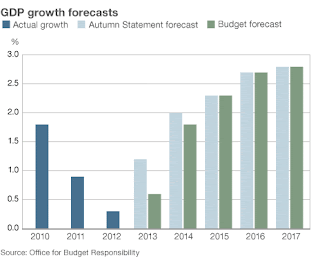by Fergus Houghton-Connell
After announcing the UK Budget on Wednesday, George Osborne made
it clear that he wanted to continue with his main objective of reducing
borrowing. This usually means more cuts, which there are, however Osborne has
included a few measures to try to make it easier to buy homes, to increase the
disposable income of the poor, as well as increasing spending on
infrastructure. So, will it work or do we face many years ahead of a
‘flat-line’ economy, or even a triple-dip recession?
Most government departments face a 1% cut in their budget for the
next two years, with the NHS and schools being exempt from the cuts.
Essentially, the chancellor is trying to squeeze every penny out of the
government as possible, without having to borrow any more money, which I
believe is the right move. Almost all government departments have underspent in
their budgets in the last few years, so instead of letting the departments
spend more than is necessary, why not use the extra cash on infrastructure projects
and other areas that will increase Gross Domestic Product (GDP). Overall, £11.5
billion of cuts are expected in the 2015-2016 Spending Review, a significant
amount that can be reinvested in trying to increase Growth in the economy.
On the whole, I see three areas that are likely to increase
Growth. Firstly is the Government’s plan to kick-start the housing market.
Buyers of homes will only have to pay a 5% deposit, much lower than what some
banks demand, and the ‘shared equity’ scheme, which offers people a 20%, of the
value of the house, interest free loan on newly built homes. The idea is to try
to get more people buying homes, thus increasing Consumption and therefore GDP.
It does come at a cost, but this will be mostly covered by the spending cuts in
other areas, and there are still questions as to whether it will really
increasing the demand in the housing market.
Secondly is the refund of the first £2000 of the National
Insurance that businesses have to pay for employing people. For large companies,
this will have almost no effect, but for small businesses, who employ around
50% of the workforce, this is quite substantial. It means that small businesses
can employ more people, as it is now cheaper, and this makes up part of the
prediction that there will be 600,000 more jobs available this time next year,
as well as the claimant count, the number of people who claim benefits, will
fall by 60,000.
Thirdly is the new spending on infrastructure. £15 billion more
will now be spent on infrastructure by 2020, with £3 billion to be spent by
2015-2016. The idea behind this one is to pay companies to work, who will then
employ more people to complete the job and then tax revenues from income tax
and corporation tax will increase, with the added bonus that the government are
going to have to borrow only £2.5 billion more, it seems that this is a win-win
situation. However recent studies by the Office for Budget Responsibility (OBS)
have shown that spending on infrastructure could contribute as little as 0.06%
towards GDP.
There are other policies that I don’t believe will have a big
effect on Growth, at least in the near future, which include the reduction of
Corporation tax by 1%, the reduction of the highest tax percentage to 45% from
50%, the 20% tax relief on childcare up to £6000 per child and the earlier than
planned increase in the personal allowance, the amount you earn that you don’t
have to pay tax on, to £10,000. I feel that these are all positive policies to
try to increase the disposable income of families, as well as encouraging
businesses and rich people to live in the UK, but the effects of these policies
will be felt in a few years time I feel, because consumer confidence is still
very low. Nevertheless, they are good policies.
If I’m honest, I find this Budget quite boring, at least in
economic terms, and, as perfectly summed up by BBC’s Nick Robinson, a
‘political budget’. George Osborne is trying to show that he can run the
country whilst borrowing a lot less than Labour would, if they were in charge,
which some would argue is the only thing he will be left to stand on come the
election next year. However I believe that the policies the chancellor has
actually proposed can be effective. I believe that the chancellor’s main
objective from the Budget is to increase employment; one of the few successes
last year, whilst still keeping the amount the country borrows relatively low,
which he has achieved last year and looks set to continue to achieve this goal
next year too.
As shown in the diagram, the Growth forecasts are on an upward
trend, clearly a sign that the economic policies of the Tories are working;
with the added bonus that borrowing is expected to decrease every year for the
same time period. If Labour were in power, Growth would probably be a lot
higher, however debt levels would be much higher than they currently are too.
Overall we will just have to wait until the quarterly growth figures are
released to see if any of the policies will work. In the mean time, we just
have to remember that Growth looks as if it can only go up.

I would question the statement that forecasts for increasing growth show the Tories policies are working. Following a recession, particularly one as deep as Britain's, it is natural for the economy to recover. I suggest the Tories policies have delayed and reduced recovery.
ReplyDelete